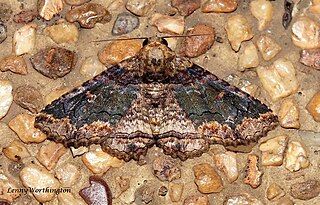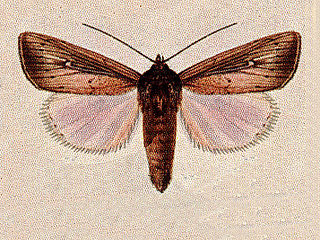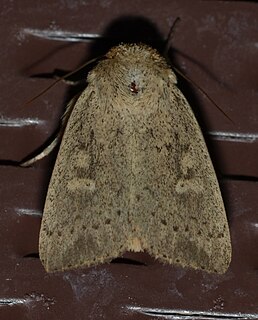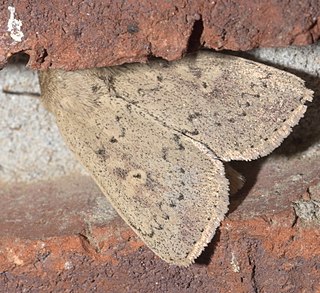
The shoulder-striped wainscot is a moth of the family Noctuidae. The species was first described by Carl Linnaeus in 1761. Some authors place it in the genus Mythimna. It is found throughout Europe and in Russia to the west of the Urals.

The Mythimnini are a small tribe of moths in the Hadeninae subfamily. As numerous hadenine genera have not yet been assigned to a tribe, the genus list is preliminary.
Wainscot is a panelling, often wooden, applied to an interior wall of a building.

Leucania obsoleta, the obscure wainscot, is a moth of the superfamily Noctuoidea. The species was first described by Jacob Hübner in 1803. It is found in Europe.

Leucania is a genus of moths of the family Noctuidae first described by Ferdinand Ochsenheimer in 1816.

The Devonshire wainscot is a species of moth of the family Noctuidae. It is found in southern Europe, North Africa, Turkey, Israel, Lebanon.

Leucania loreyi, the cosmopolitan, false army worm or nightfeeding rice armyworm, is a moth of the family Noctuidae. It is found in most of African countries, the Indo-Australian subtropics and tropics of India, Sri Lanka, Myanmar, the eastern Palearctic realm, and the Near East and Middle East. The species was first described by Philogène Auguste Joseph Duponchel in 1827.

Pericyma cruegeri, the poinciana looper, is a moth of the family Erebidae. The species was first described by Arthur Gardiner Butler in 1886. It is found in south-east Asia including Hong Kong, Taiwan, Vietnam, Thailand, Sumatra, Peninsular Malaysia, Borneo, the Philippines, New Guinea, and in Australia, northern New South Wales and Queensland. Furthermore, it is an introduced species in Hawaii and Guam, where it was first detected in 1971. In Japan, it was first detected in 1986 in Ishigaki Island and the living area is expanded to Okinawa Island by 2000.

Leucania latiuscula is a moth of the family Noctuidae. It is native to the Caribbean and might be introduced to Hawaii.

Leucania commoides, the comma wainscot or two-lined wainscot moth, is a species of cutworm or dart moth in the family Noctuidae. It was described by Achille Guenée in 1852 and is found in North America.
Leucania multilinea, the many-lined wainscot, is a species of cutworm or dart moth in the family Noctuidae. It is found in North America.
Leucania oaxacana is a species of cutworm or dart moth in the family Noctuidae. It is found in North America.

Leucania inermis, the unarmed wainscot, is a species of cutworm or dart moth in the family Noctuidae. It is found in North America.

Leucania pseudargyria, the false wainscot, is a species of cutworm or dart moth in the family Noctuidae. It is found in North America.
Leucania subpunctata, known generally as the white-dotted wainscot or forage armyworm moth, is a species of cutworm or dart moth in the family Noctuidae. It is found in North America.
Leucania oregona, the oregon wainscot, is a species of cutworm or dart moth in the family Noctuidae. It is found in North America.
Leucania senescens is a species of cutworm or dart moth in the family Noctuidae. It is found in North America.

Leucania incognita is a species of cutworm or dart moth in the family Noctuidae first described by William Barnes and James Halliday McDunnough in 1918. It is found in North America.

Leucania adjuta, the adjutant wainscot, is a species of cutworm or dart moth in the family Noctuidae. It is found in North America.

Leucania ursula, the ursula wainscot, is a species of cutworm or dart moth in the family Noctuidae. It is found in North America.















